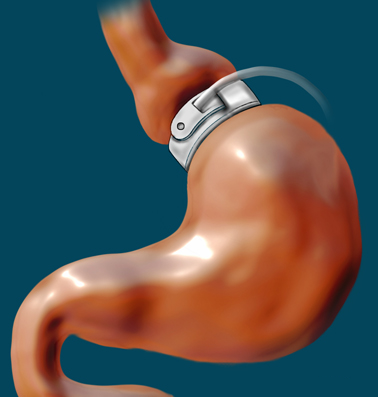Lap band surgery: Almost a one-size-fits-all solution

Photo by CC user Xopusmagnumx on Wikipedia English
In comparison to some weight loss procedures, it would be fair to say that lap band surgery is one of the more recent additions to the industry. Sure, it’s certainly been established having first received FDA approval in 2001 – but it’s not got the decades of history that some rival procedures have.
Then again, maybe that’s a good thing. This is a procedure which has pretty much revolutionized the weight loss industry – and we don’t use that term lightly. The fact that you can be in and out of hospital in the same day speaks volumes about its simplicity – while there are more than enough resources on the internet which highlight how much weight people are using courtesy of the procedure.
Another positive about lap band surgery is the amount of people who qualify for it. Due to the risk-averse nature of the surgery, it probably won’t come as a surprise to read that it’s suitable for a lot of patients.
Here is an outline of some of the basic requirements, to highlight how open the treatment has become.
You need to be obese, and have the BMI to back it up
This first requirement should go without saying; you have to be obese. Furthermore, your Body Mass Index must be able to back this up. Generally, practices won’t entertain the lap band system if your BMI isn’t at least 40kg/m2 – or sometimes 30kg/m2 if you suffer from an obesity-related problem.
We’re going to assume that all readers fall into the above category, so we’ll swiftly move onto the next point.
You don’t have long-term weight loss success stories to hand
This is probably one of the more interesting requirements that most surgeons have.
While the lap band system is most definitely simpler than most rival solutions, it’s still classed as surgery. In other words, it should only be considered after you have attempted to lose weight via other methods such as dieting and exercise.
It’s generally stated that if you’re unable to experience long-term weight management success, you can be a candidate for the lap band.
Your obesity is caused by lifestyle choices
This is another interesting point and if your obesity is caused by a form of illness, it’s likely that you aren’t suitable for the treatment.
Due to the way in which the system works, it is primarily designed for those people who are struggling with weight due to their own choices. It is unlikely to be as effective if you are suffering from obesity due to a condition.
You are prepared to make changes to your lifestyle
On the subject of lifestyles, it’s worth mentioning this requirement as well. Anyone who is considering lap band surgery must be willing to make changes to their lifestyle after the procedure.
As the lap band effectively shrinks the stomach, you need to be in a position where you won’t be consuming as many calories. It will restrict the amount of food that your stomach can hold – so you must be prepared for this.


